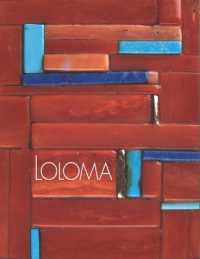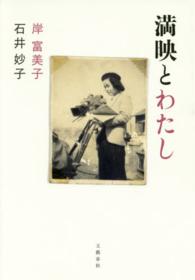- ホーム
- > 洋書
- > 英文書
- > Cinema / Film
Full Description
Considers the remake from a variety of critical and theoretical perspectives and positions it alongside other serialized cultural forms
Examines the historical significance of the remake in revitalizing local industries and breathing life into established film genres (e.g., action-adventure, crime drama, romantic comedy, the Western, etc.)
Draws attention to previously overlooked motion pictures produced in East Asia and acknowledges the significant contributions of several prolific yet neglected filmmakers
Re-evaluates canonical texts and offers fresh assessments of legendary auteurs such as Ozu Yasujiro, Yu Hyun-mok, Miike Takashi, Johnnie To, and Stephen ChowShowcases the role of remakes in forging cross-cultural alliances both within and beyond the East Asian region while pointing toward prospects of increased transnational coproductions in the coming years
This wide-ranging, historically grounded exploration of motion picture remakes produced in East Asia brings together original contributions from experts in Chinese, Hong Kong, Japanese, South Korean, and Taiwanese cinemas and puts forth new ways of thinking about the remaking process as both a critically underappreciated form of artistic expression and an economically motivated industrial practice. Exploring everything from ethnic Korean filmmaker Lee Sang-il's Unforgiven (2013), a Japanese remake of Clint Eastwood's Western of the same title, to Stephen Chow's The Mermaid (2016), a Chinese slapstick reimagining of Walt Disney's The Little Mermaid (1989) and Hans Christian Andersen's 1837 fairy tale, East Asian Film Remakes contributes to a better understanding of cinematic remaking across the region and offers vital alternatives to the Eurocentric and Hollywood-focused approaches that have thus far dominated the field.
Contents
INTRODUCTION East Asian Film Remakes - David Scott Diffrient
PART I: Re-fleshing the Text: Sex, Seduction, Desire
CHAPTER 1. How to Sell a Remake: The Gate of Flesh Media Franchise - Irene González-López
CHAPTER 2. Against Anaesthesia: An Empty Dream, Pleasurable Pain, and the 'Illicit' Thrills of South Korea's Golden Age Remakes - David Scott Diffrient
CHAPTER 3. Two Faces of Seduction: Tragic Heroines and Heroic Victims in Chor Yuen's Intimate Confessions of a Chinese Courtesan and Lust for Love of a Chinese Courtesan - Andrew Grossman
CHAPTER 4. Japanese Self-Made Film Remakes as Self-Improvement: Professional Desires and DIY Fulfilment, from Panic High School to Tetsuo - Mark Player
PART II: Serialising Ozu: The Enduring Legacy of a Cinematic 'Tofu Maker'
CHAPTER 5. Definition and Progression: Ozu Yasujirō's 'Noriko Trilogy' - Alastair Phillips
CHAPTER 6. A Remake, But...: Media Infantility in Ozu Yasujirō's Good Morning - Rea Amit
CHAPTER 7. The Cinema of Serial Vitality: Ozu Yasujirō and Yamada Yoji - Steve Choe
PART III: Revisiting Personal/Political Traumas in East Asian Action Films, Gangster Films and Westerns
CHAPTER 8. Opting Out of History: Miike Takashi's New Graveyard of Honor - Earl Jackson
CHAPTER 9. The Promise of Hokkaidō: Trauma, Violence, and the Legacy of the Imperial Frontier in Lee Sang-il's Unforgiven - Lance Lomax
CHAPTER 10. Benny Chan's Connected and the Post-Handover Hong Kong Action Film - Gary Bettinson
CHAPTER 11. Vessels and Cargos: Spaces of Inclusion and Exclusion in Johnnie To's Drug War and Lee Hae-young's Korean Remake Believer - Jinhee Choi
PART IV: Local Flavours and Transcultural Flows in East Asian Comedies, Dramas and Fantasies
CHAPTER 12. The Power of Healing in Little Forest(s): Cross-Cultural Perspectives on Food, Friendship, and Self-Identity, from Japan to South Korea - Nam Lee
CHAPTER 13. More than Blue and Man in Love: Transnational Korean-Taiwanese Film Remakes as a Facilitator for Taiwan Cinema - Ting-Ying Lin
CHAPTER 14. The Pan-Asian Miss Granny Phenomenon - Jennifer Coates, Hsin Hsieh, Sung-Ae Lee, and Kate E. Taylor-Jones
CHAPTER 15. Remaking in the Age of Chthulumedia: Stephen Chow's The Mermaid - Kenneth Chan








